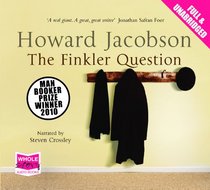Helpful Score: 6
The book came right before we left for the March of the Living, a 2-week trip to visit concentration and death camps in Poland for Yom HaShoa (Holocaust Remembrance Day) and then to Israel for Yom HaAtzmaut (Israel Independence Day). I took the book along to read on the plane and at night at the hotels...maybe not the best choice of reading material for such a trip!
The Finkler Question examines several aspects of anti-Semitism from a supposedly humorous point of view. The book was engagingly written, but the characters, in my mind, were in no way likeable. Treslove, the wannabe Jew is pathetic in his desire to be Jewish, the desire coming from a mugging incident in which the female who assaulted him said what sounded to him like "You Ju," which he took to mean she took him for a Jew. The reader never finds out who she was or if this interpretation of what she said was correct, but Treslove manages to have a love affair with the great niece of his aged former teacher who is suffering the loss of his beloved wife. Does the affair with a Jew make him a Jew? Of course not.
Limor, the aged widower, is not sufficiently developed as a character so that, while one might feel for him in his situation, it's not personal.
The third friend of this trio is Finkler, a former schoolmate of Treslove's who also studied with Limor. Treslove always took Finkler for the quintessential Jew (perhaps because for years he was the only Jew he knew) and so phrases his questions about what is Jewish as "the Finkler question." Stereotyping at its most extreme--although that may be the humor that Jacobson was aiming for.
I haven't read anything else by Howard Jacobson that I can remember, so I can't really judge the author by this one book. I am not quite sure why it won an award...perhaps because anti-Semitism is so prevalent today that its topic is considered timely. The fact that it deals with Jews who hate Israel and don't care about being Jewish, what some would call self-hating Jews, makes it a topic to anger some readers while engaging others.
I often find it useful to read opinions of those who don't share mine, which is one reason I chose to read The Finkler Question. Do I now have a better understanding of these self-hating Jews (they are part of a group called ASHamed Jews in the novel)? No, I just find them ill informed and ungrateful and looking to fit in with "popular" sentiment regarding Israel and the Jews. What I would say to them if they were real people is "get some facts before you spout out hate about your own people and their sovereign land. You might be surprised if you learned the truth."
The Finkler Question examines several aspects of anti-Semitism from a supposedly humorous point of view. The book was engagingly written, but the characters, in my mind, were in no way likeable. Treslove, the wannabe Jew is pathetic in his desire to be Jewish, the desire coming from a mugging incident in which the female who assaulted him said what sounded to him like "You Ju," which he took to mean she took him for a Jew. The reader never finds out who she was or if this interpretation of what she said was correct, but Treslove manages to have a love affair with the great niece of his aged former teacher who is suffering the loss of his beloved wife. Does the affair with a Jew make him a Jew? Of course not.
Limor, the aged widower, is not sufficiently developed as a character so that, while one might feel for him in his situation, it's not personal.
The third friend of this trio is Finkler, a former schoolmate of Treslove's who also studied with Limor. Treslove always took Finkler for the quintessential Jew (perhaps because for years he was the only Jew he knew) and so phrases his questions about what is Jewish as "the Finkler question." Stereotyping at its most extreme--although that may be the humor that Jacobson was aiming for.
I haven't read anything else by Howard Jacobson that I can remember, so I can't really judge the author by this one book. I am not quite sure why it won an award...perhaps because anti-Semitism is so prevalent today that its topic is considered timely. The fact that it deals with Jews who hate Israel and don't care about being Jewish, what some would call self-hating Jews, makes it a topic to anger some readers while engaging others.
I often find it useful to read opinions of those who don't share mine, which is one reason I chose to read The Finkler Question. Do I now have a better understanding of these self-hating Jews (they are part of a group called ASHamed Jews in the novel)? No, I just find them ill informed and ungrateful and looking to fit in with "popular" sentiment regarding Israel and the Jews. What I would say to them if they were real people is "get some facts before you spout out hate about your own people and their sovereign land. You might be surprised if you learned the truth."
Great writing and at times, laugh out loud funny, but in some places the story was a little uneven.
Helpful Score: 2
not my favorite...haven't finished it...not sure i will
Helpful Score: 1
I thought this book would be eye opening to Jews, relationships and Gentiles. The writing is good, but the story line is fractured in too many ways for my enjoyment. I'm thinking short stories would of been better.
Helpful Score: 1
Just could not bring myself to care about this character. Not sure what others saw in this book.




